Whether entrepreneurs have just the seed of an idea, a business that’s already taken off, or something in between, Thought Into Action (TIA) provides them with a network of mentors and helps them develop their skills.
Megan Martis ’20 perfected her pitch for the “Shark Tank” competition for this year’s Entrepreneur Weekend. It worked: She won second place for her hosiery business, CLOVO.
“You live in this space, and you differentiate yourself,” Bharat Mediratta ’92, one of the judges, told Martis. “I’m impressed with what you’ve done so far.”
Jessica Steib ’23 also received encouragement from alumni at the end of the semester. Jake ’16 and Carolyn ’19 Danehy, the cofounders of previous TIA venture Fair Harbor, called Steib to say that her personalized sneaker company Blank Canvas holds a lot of promise in the custom clothing sphere.
And, if it weren’t for the assistance of TIA, the cofounders of the food delivery service ‘Gate Grubs wouldn’t have connections to Hamilton restaurant owners, which facilitated growth of their new venture while supporting the community.
The TIA incubator is open to students, alumni, faculty and staff members, and community members. In fact, local resident Jill Nelson won first place in this year’s “Shark Tank” with Natural Beauty, which makes breast prostheses for women who have had mastectomies.
“The blessing of Colgate is that we’re all in this together, and the collaboration and the ability to learn about different people is extraordinary,” David Fialkow ’81 said while judging the 2021 Entrepreneur Weekend Shark Tank. Fialkow, Colgate’s 2020 Entrepreneur of the Year, and Mediratta were joined by this year’s Entrepreneur of the Year, Nick Kokonas ’90, as well as Deborah Benton P’23.
’Gate Grubs
Thousands of hungry college students are waiting. You have three months to build a business and get it off the ground in time for the start of the fall semester. Go.
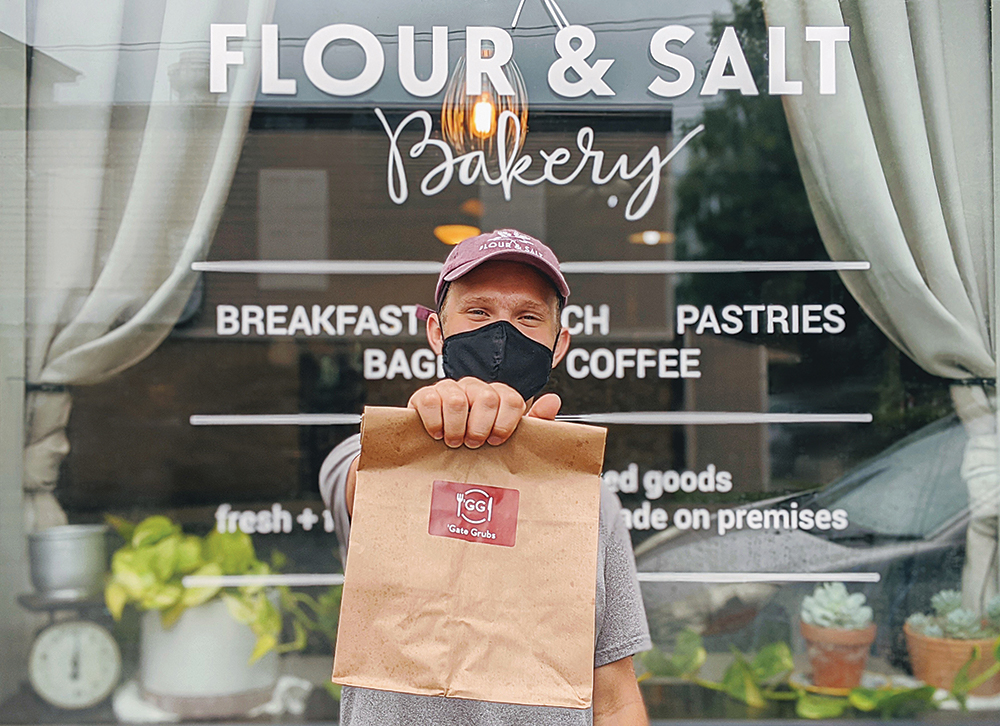
This scenario sounds like a reality TV competition, but it’s actually how Adrienne Vaughn ’22, Ebrahim Almansob ’22, and Nick Gerlach ’22 pulled off the launch of ’Gate Grubs last August.
The meal delivery service has not only filled a need for students, but it also helped support Hamilton-area restaurants — many of which are small, family-owned businesses — during difficult times.
“From September, when we get on campus, to May, when we leave campus, that’s a large bulk of their revenue, and since we left campus early in March [2020], that’s a pretty long time for them to be losing revenue,” Vaughn says. The coming fall would bring its own challenges, with students in quarantine for two weeks and sit-down dining restrictions imposed by New York State.
The pandemic was the impetus for ’Gate Grubs from a personal standpoint as well. Heading into the summer, Almansob initially had an internship lined up, but it fell through due to COVID-19. He was living at home in Nebraska when Vaughn, his best friend in Maryland, suggested: “We should start a business this summer.” Their other friend, Gerlach, jumped on board and proposed they start a food delivery service because his brother had success with a similar venture at Cornell.
The idea hit home for Almansob as he was witnessing the impact the pandemic was having on the family-owned deli where he’d worked during high school. “I was like, ‘All right, that’s a good way to give back to the Hamilton community and help the campus too.”
Through TIA, the cofounders gained the support of Hamilton’s Partnership for Community Development in the form of a grant to start the business and connecting them with restaurants.
Of course, there were bumps in the road as August approached. The team wasn’t able to begin web development until four weeks before the return to campus — putting them on a tight deadline. “Typically, there’s beta testing, where you only allow a certain number of people to use it, like a testing population,” Vaughn says, “but we didn’t have the time for that. We were testing a product that was completely new to a population as we were fully in business.”
Gerlach adds: “We messed up so many times; we were like firefighters in those first couple of weeks.”
Even so, ’Gate Grubs received 800 orders in the first two weeks while students were in quarantine and even sold out of availability for certain mealtimes. Clearly, they’d discovered their niche. “We found that there’s a gap in the food delivery market in small college towns,” Gerlach says. “There’s a student body who’s used to food delivery and who come from areas where they have Uber Eats and Grubhub.”
After the quarantine ended, orders decreased, but the slower pace gave the cofounders time to improve their business by better defining roles and smoothing out the problems they’d been facing with the website’s backend.
And although business slowed, making a huge profit was never the motivating factor. “It was more to help alleviate a problem as well as get good food to students in a fast and easy way,” Vaughn says.
Adds Almansob, who is the CFO, “We generated more than $60,000 in revenues for these restaurants.”
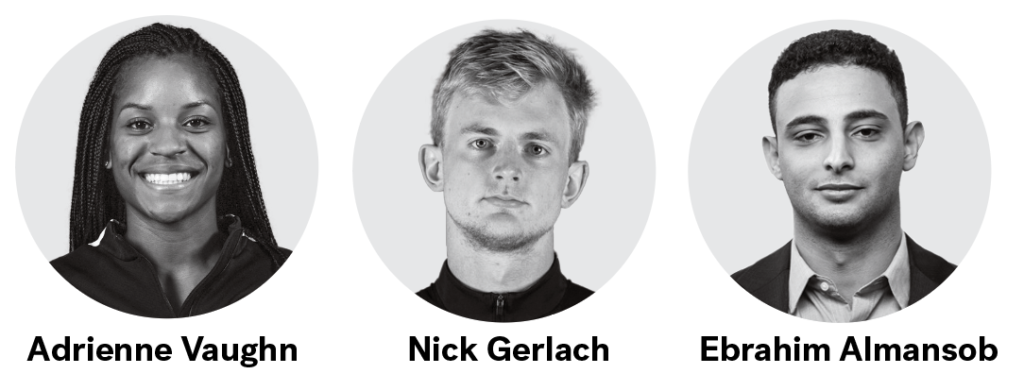
For this fall, they’re looking at ways to expand their customer base and developing a program through which parents can gift meals to students. In thinking about the longer term, the cofounders are talking about expanding to other smaller schools that lack food delivery systems.
“We’re happy that it worked,” Gerlach concludes.
CLOVO: The CLOthing ReVOlution
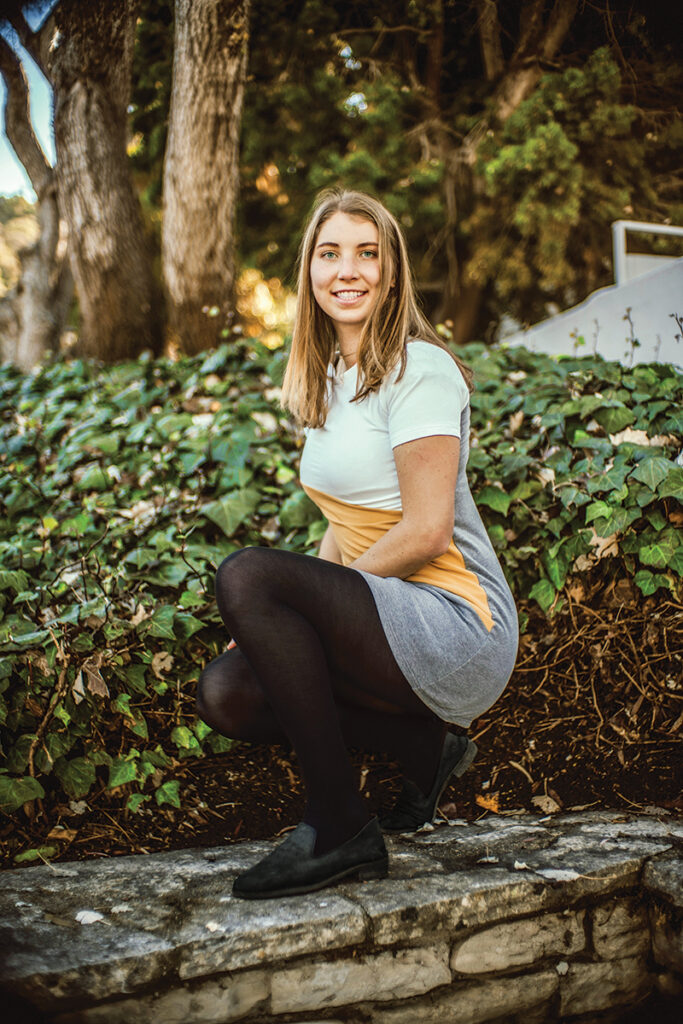
Everything our skin comes into contact with — from lotions to apparel — may have chemicals that are absorbed into our bodies. Carcinogens such as formaldehyde in new clothing, perfluorocarbon in waterproof gear, and phthalates in activewear are just a few examples.
“They build up in our bodies over time. There’s not a lot of research on how that will affect us in 50 years, but it’s pretty terrifying,” says Megan Martis ’20, who’s created a business centered on sustainable apparel — starting with tights. She founded CLOVO in 2018, through which she sells sheer tights that “empower women and the environment.”
Why tights? Martis is fixing a well-known nuisance: Hosiery is uncomfortable — it doesn’t stay up, and it’s itchy. “I went to Catholic school my whole life, and I had to wear a skirt with my uniform,” she explains. “However, I’m pretty tall, so [my tights] would just sag all day, which is really awkward when you’re walking down the hallway trying to pull up your tights without anyone noticing.” Then, when she came to Colgate, the cold temperatures required that hosiery remain a wardrobe staple. “I was just so fed up with it,” she says, “I decided to do something.”
Majoring in astrogeophysics, Martis spent three years in the lab with Linda Tseng, assistant professor of environmental studies and physics. Studying — and eventually writing her senior thesis — with Tseng, Martis learned about how microplastics enter the water system every time we wash our clothes. This not only pollutes the rivers and oceans, but also, when humans eat fish, we’re ingesting those toxins.
Having identified the problems she wanted to solve, Martis joined TIA in her junior year to get CLOVO off the ground. “I knew it had an ecosystem of mentors and people who could help,” she says. That year, Martis conducted market research with millennials (whom she considers her target audience); researched materials; and critically assessed how tights are designed, by looking at the ways women pull them up and how they could stay up. “That’s [another way] I used my physics background,” Martis says.
The company sells two main products: EverTights, which incorporate thin, spandex shorts to eliminate sagging; and RevoTights, which do not include shorts. They’re made from Tencel — a tree material from sustainably grown forests in Europe that is produced in a renewable energy–powered manufacturing plant.
“They’re not itchy because Tencel is a cellulosic structure, so when you sweat, it absorbs it rather than letting it sit on your skin. And, because of that natural tree fiber, it’s able to regulate temperature a lot better,” Martis says. “It’s also more durable than cotton and nylon, so you can pull on it harder than you would be able to with normal tights.”
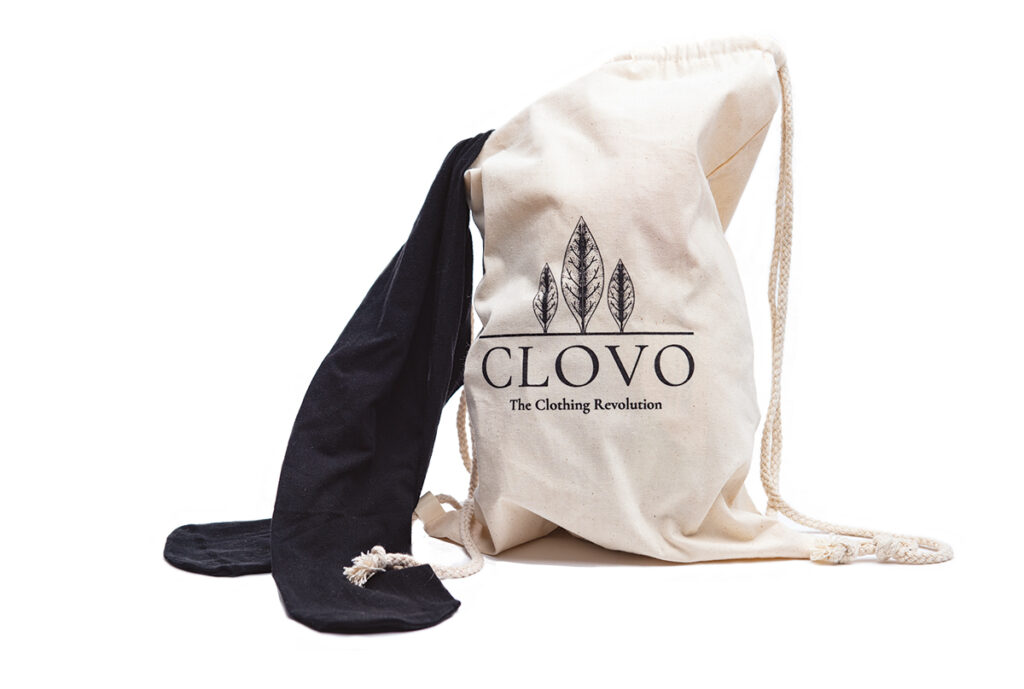
CLOVO — named for “CLO”thing Re“VO”lution — additionally aims to empower women by being a comfortable fit for all body types. “One of the reasons tights rip a lot is because they’re not formfitting to all women, and that’s something I wanted to change,” Martis says. “I wanted to steer away from the idea that women should constrict themselves to a certain form — which a lot of shapewear does — and allow women to embrace their natural shape. This is a huge movement right now.”
This tenet is one of the ways she distinguishes her business from competitors, as she pointed out during the spring TIA Entrepreneur Weekend pitch competition. CLOVO was one of four ventures considered for cash prizes.
“The hosiery market size in the U.S. is about $14 billion; the global hosiery market is about $50 billion,” Martis told the judges. “Looking at the sustainable clothing industry, by 2030, it is expected to reach about $16 billion. Currently, about 73% of millennials will spend more on sustainable clothing options today.”
A Kickstarter campaign last summer helped CLOVO launch the tights, and ever since, they’ve been gaining traction through social media influencers. “Our product needs to be explained,” she says, “so that platform is where we’re able to talk more about the tights, environmental pollution, and women’s empowerment. Being able to story-tell across these different platforms has really driven sales.”
CLOVO is now starting to meet its goal of hitting international markets. This summer, the tights will be sold through Sustainable Marketplace in Australia — where it will be winter June–August. Martis also hopes to start selling in retail shops and department stores. And, eventually, she wants to explore more sustainable wearables. “I’ve always thought of CLOVO as a science of fashion company rather than strictly fashion.”
Meanwhile, she’s building her skill set at the University of Michigan by earning a master’s in energy systems engineering as well as a certificate in innovation and entrepreneurship. Martis continues to pursue the “astro” part of her Colgate physics degree by working with the nonprofit Mars Initiative as well as Students for the Exploration and Development of Space. But, she’s decided, for the focus of her vocation, “I want to spend my career saving the earth rather than leaving it.”
Blank Canvas
Jessica Steib ’23 can paint the Colgate “C” blindfolded. As founder of Blank Canvas, Steib creates customized sneakers, and several pairs have featured a Colgate theme.
President Brian W. Casey received the first set of those special sneaks. She’d emailed him during winter break to ask if he’d like a pair of personalized shoes. He agreed, with a request: “The new Colgate C was his one specification,” Steib says.
Casey posted the creative kicks on social media, as did her mom, Rachel Comisar ’92 Steib, inspiring others to place orders for themselves and graduation presents.
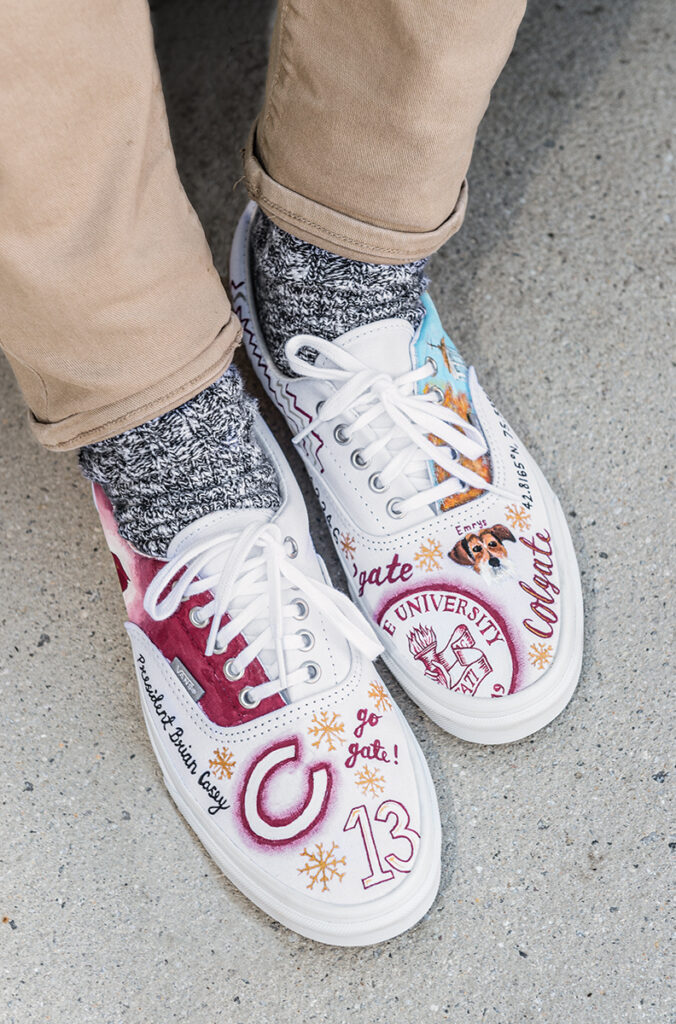
A graduation gift actually led to the inception of Blank Canvas. In the spring of 2020, Steib’s best friend was finishing high school and preparing to attend Tulane University. “I wanted to make her something that was truly unique, that she would cherish for a long time and find very personal,” Steib explains. “I decided to make her a pair of Tulane sneakers.”
The graduate’s friends were so impressed with the final product, they asked Steib to make sneakers for them. She started accepting commissioned work and marketing her business during the summer. By the time Steib joined TIA last fall, Blank Canvas was up and running.
“I’ve learned time management skills through being in TIA,” says the environmental geography major who is minoring in architecture. Steib has become more efficient in her process and estimates that it takes her about five hours to finish an order. This spring, she was at 75 orders and counting. The price is based on the amount of detail requested by the client; customized Colgate sneakers are approximately $300.
Other commissioned pairs have included Converse dotted with strawberries, Vans high tops with punchlines from The Office, and Nike Air Force Ones with Black Lives Matter statements.
“Sometimes people are like, ‘I want it to be a surprise,’ and they just let me get creative with it,” Steib says.
She’s been taking art classes since she “could hold a pencil,” mostly in drawing and painting. Last semester, Steib took a drawing class with Professor Lynette Stephenson and plans to take a painting class with her in the fall.
Blank Canvas is a personal endeavor for Steib and an individualized experience for her customers, starting with the initial one-on-one consultation. Her goal is to help people express themselves through their footwear — and, she hopes, other apparel in the future.
At the end of the spring semester, Steib was painting yet another pair of Colgate-themed sneakers, this time for someone close to her. Paul Comisar ’56, Steib’s grandfather, was celebrating his 88th birthday on May 8, and she wanted to surprise him with a one-of-a-kind gift. She decorated the fresh white sneakers with maroon accents: the University seal, the words “swim & dive,” and, of course, the Colgate C.
Ventures selected for this year’s Entrepreneurs Fund Summer Accelerator, receiving $7,500 in grant funding and hands-on mentorship during an eight-week program:
Designs by Madison Taylor: Madison Bailey ’18, Joseph Brozek ’17, Morgan Bailey
First Impression Nails: Kadian Dixon ’18
Hawaa Organics: Sally Ngoje ’19
Shotquality: Simon Gerzberg ’22, Yasoom Khalid ’21, Kunal Thadini
Virtual Babysitters Club: Kyle Reilly ’16
